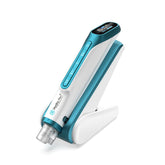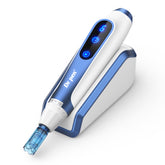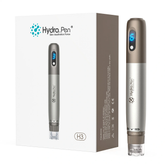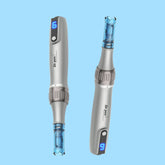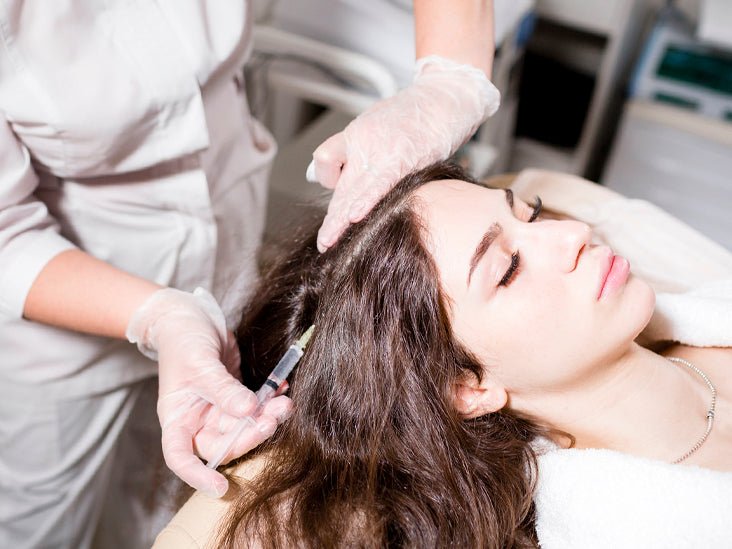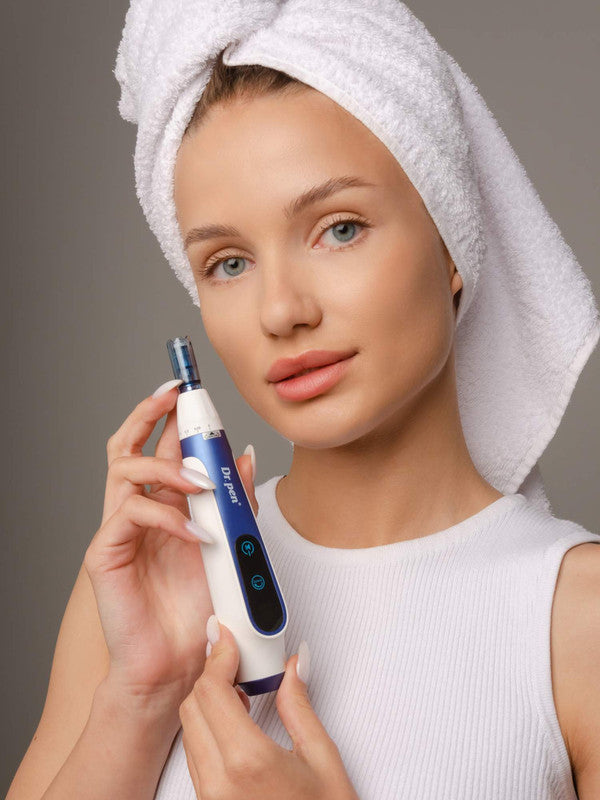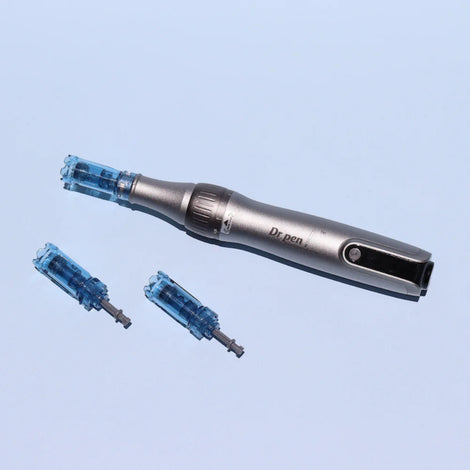It’s no secret that microneedling is fantastic for staving off the ageing process of the skin - but did you know that it’s also an amazing treatment in the fight against hair loss and thinning hair?
Today we explore all things microneedling for hair loss.
WHY DO WE LOSE HAIR?
Hair loss is something that impacts many people, and there can be a multitude of reasons. Some of the most common reasons for hair loss or hair thinning include:
How can hair loss be treated?
Hair health relies on scalp health - and as the scalp is part of your skin, it responds much the same as skin elsewhere on the face and body. For a healthy scalp, you need to maintain a healthy diet rich in nutrients (including essential fatty acids), get adequate rest and plenty of sleep.
Of course, not all hair loss is related to lifestyle, and some types of hair loss may require additional treatment modalities to recover.
Microneedling is an excellent choice for those who wish to boost their hair loss treatment, to slow the spread of hair thinning or for those who want to improve their overall scalp health.
WHAT TYPES OF HAIR LOSS CAN MICRONEEDLING TREAT?
Hair loss can be notoriously tricky to treat, as there are many causes and factors.
However, dermatologists believe that microneedling shows promising results in treating hair loss such as that caused by traction alopecia (caused by frequent pulling of the hair), alopecia areata (where the immune system attacks hair follicles), and telogen effluvium (excess hair shedding due to stress).
HOW DOES MICRONEEDLING WORK TO TREAT HAIR LOSS?
Microneedling works on the skin by creating micro-injuries known as microchannels. These microchannels allow for skincare products to penetrate deeply into the skin, and also triggers the skin’s trauma healing response.
When the skin perceives an injury, its response is to produce more collagen and elastin. This is why microneedling is also known as Collagen Induction Therapy. In skincare, this healing response allows for the skin’s appearance to be rejuvenated with anti-ageing effects.
Did you know: Collagen is most well-known as a protein for helping your skin look younger, but it’s also essential for hair health.
When it comes to microneedling for hair loss, the effects work in a very similar way as they do on our face.
This is because similar to our skin elsewhere, the skin on our scalp also loses collagen as we age. This can result in slow hair growth and passive hair follicles.
Collagen and hair follicles exist within the same layer of the skin (the derms), and when collagen production naturally slows down at around age 30, this can affect the strength of your hair follicles.
Microneedling for hair loss
Microchannels are created on the scalp where the hair follicles sit. The microchannels then generate a rise in growth factors (including collagen) produced naturally by the skin, which causes an increase in hair production.
Microneedling also exfoliates the surface of the scalp, resulting in a deep cleansing action that removes product build-up (such as that of hair sprays) which can suffocate the hair follicles and prevent new growth.
The microneedling process also stimulates the scalp, which can help to trigger the growth of new hair and the strengthening of existing follicles.
Microneedling brings blood flow to the scalp and stimulates the production of nutrients, which results in an overall healthier scalp - so even if your hair loss or hair thinning is minimal, your scalp health will still benefit. You’ll notice thicker, stronger hair overall.
How do I microneedle my scalp at home?
Microneedling the scalp for hair growth can be performed many different ways. You may wish to start gently with a derma roller, which is used by gently rolling the barrel across the scalp.
If you wish to microneedle at a greater depth or with a little more power, you might instead opt to use a microneedling pen. Microneedling pens are motorised and with variable needle speeds and depths, give you greater options for your specific needs.
TIP: Not sure whether to go with a derma roller or microneedling pen to treat hair loss? Be sure to check with your healthcare practitioner to assess the best fit for your needs.
If you need help choosing the right device, you can also free to call us at any time, and our Beauty Advisor will be happy to assist you!
When microneedling your scalp at home, we suggest wetting your hair down first to create a flat surface, and parting it into sections so you can keep track of where you’ve already rolled/needled.
Move your derma roller or microneedling pen in one direction, to avoid your hair getting tangled in the process.
For microneedling the scalp, we recommend using a needle depth of 1.5mm as this will best penetrate through hair and scalp buildup.
How frequently should I microneedle my scalp at home to treat hair loss or thinning hair?
To start with, we suggest microneedling your scalp once a week for the first month, then twice a week in the second month.
After that, you can move back down to microneedling your scalp once a month to maintain your results.
This is the suggested treatment schedule for general use, as it allows for the healing process of the scalp to complete fully, so you can accurately gauge your results.
Remember, this is a general guide only so to achieve the best results for your specific hair loss needs, please check with your healthcare professional.
WHAT DOES MICRONEEDLING THE SCALP FEEL LIKE?
Your scalp may feel a little irritated or tender after microneedling, and just like microneedling the face, your scalp may experience some redness.
Your hair will generally hide any redness.
Aftercare Tip: If you are spending time outdoors, be sure to also take precaution by covering your scalp with a hat to protect it from harmful UV rays whilst it recovers and heals from the microneedling process!
You can calm the area by applying a little oil or a serum. We recommend using Serum, which will calm the area, balance the production of sebum and stimulate the follicles, aiding the process of increasing hair growth.
The protein and keratin bonds that form your hair strands need moisture to retain their strength and elasticity - but too much moisture can overwhelm your scalp and make it feel greasy.
Our Hair Growth Serum’s unique formulation deeply nourishes the scalp and hair, without stimulating an overproduction of oil, giving your scalp the perfect balance of moisture and strength.
HOW DO I KNOW IF MICRONEEDLING MY SCALP IS RIGHT FOR ME?
If you’ve got questions, that’s understandable! It can be overwhelming knowing where to start when it comes to microneedling for hair loss.
Why not join our Private Facebook Support Group, or give us a call and speak one on one to our in-house Beauty Advisor. We’re here for you!
And please don’t forget, always double-check any new treatments with your healthcare professional, as they’ll be able to advise you on the best option for your specific needs.
Today we explore all things microneedling for hair loss.
WHY DO WE LOSE HAIR?
Hair loss is something that impacts many people, and there can be a multitude of reasons. Some of the most common reasons for hair loss or hair thinning include:
- Alopecia (e.g. traction alopecia and alopecia areata)
- Pattern/genetic baldness
- Pregnancy (hormonally triggered hair shedding)
- Stress
- Poor diet (including vitamin deficiency)
How can hair loss be treated?
Hair health relies on scalp health - and as the scalp is part of your skin, it responds much the same as skin elsewhere on the face and body. For a healthy scalp, you need to maintain a healthy diet rich in nutrients (including essential fatty acids), get adequate rest and plenty of sleep.
Of course, not all hair loss is related to lifestyle, and some types of hair loss may require additional treatment modalities to recover.
Microneedling is an excellent choice for those who wish to boost their hair loss treatment, to slow the spread of hair thinning or for those who want to improve their overall scalp health.
WHAT TYPES OF HAIR LOSS CAN MICRONEEDLING TREAT?
Hair loss can be notoriously tricky to treat, as there are many causes and factors.
However, dermatologists believe that microneedling shows promising results in treating hair loss such as that caused by traction alopecia (caused by frequent pulling of the hair), alopecia areata (where the immune system attacks hair follicles), and telogen effluvium (excess hair shedding due to stress).
HOW DOES MICRONEEDLING WORK TO TREAT HAIR LOSS?
Microneedling works on the skin by creating micro-injuries known as microchannels. These microchannels allow for skincare products to penetrate deeply into the skin, and also triggers the skin’s trauma healing response.
When the skin perceives an injury, its response is to produce more collagen and elastin. This is why microneedling is also known as Collagen Induction Therapy. In skincare, this healing response allows for the skin’s appearance to be rejuvenated with anti-ageing effects.
Did you know: Collagen is most well-known as a protein for helping your skin look younger, but it’s also essential for hair health.
When it comes to microneedling for hair loss, the effects work in a very similar way as they do on our face.
This is because similar to our skin elsewhere, the skin on our scalp also loses collagen as we age. This can result in slow hair growth and passive hair follicles.
Collagen and hair follicles exist within the same layer of the skin (the derms), and when collagen production naturally slows down at around age 30, this can affect the strength of your hair follicles.
Microneedling for hair loss
Microchannels are created on the scalp where the hair follicles sit. The microchannels then generate a rise in growth factors (including collagen) produced naturally by the skin, which causes an increase in hair production.
Microneedling also exfoliates the surface of the scalp, resulting in a deep cleansing action that removes product build-up (such as that of hair sprays) which can suffocate the hair follicles and prevent new growth.
The microneedling process also stimulates the scalp, which can help to trigger the growth of new hair and the strengthening of existing follicles.
Microneedling brings blood flow to the scalp and stimulates the production of nutrients, which results in an overall healthier scalp - so even if your hair loss or hair thinning is minimal, your scalp health will still benefit. You’ll notice thicker, stronger hair overall.
How do I microneedle my scalp at home?
Microneedling the scalp for hair growth can be performed many different ways. You may wish to start gently with a derma roller, which is used by gently rolling the barrel across the scalp.
If you wish to microneedle at a greater depth or with a little more power, you might instead opt to use a microneedling pen. Microneedling pens are motorised and with variable needle speeds and depths, give you greater options for your specific needs.
TIP: Not sure whether to go with a derma roller or microneedling pen to treat hair loss? Be sure to check with your healthcare practitioner to assess the best fit for your needs.
If you need help choosing the right device, you can also free to call us at any time, and our Beauty Advisor will be happy to assist you!
When microneedling your scalp at home, we suggest wetting your hair down first to create a flat surface, and parting it into sections so you can keep track of where you’ve already rolled/needled.
Move your derma roller or microneedling pen in one direction, to avoid your hair getting tangled in the process.
For microneedling the scalp, we recommend using a needle depth of 1.5mm as this will best penetrate through hair and scalp buildup.
How frequently should I microneedle my scalp at home to treat hair loss or thinning hair?
To start with, we suggest microneedling your scalp once a week for the first month, then twice a week in the second month.
After that, you can move back down to microneedling your scalp once a month to maintain your results.
This is the suggested treatment schedule for general use, as it allows for the healing process of the scalp to complete fully, so you can accurately gauge your results.
Remember, this is a general guide only so to achieve the best results for your specific hair loss needs, please check with your healthcare professional.
WHAT DOES MICRONEEDLING THE SCALP FEEL LIKE?
Your scalp may feel a little irritated or tender after microneedling, and just like microneedling the face, your scalp may experience some redness.
Your hair will generally hide any redness.
Aftercare Tip: If you are spending time outdoors, be sure to also take precaution by covering your scalp with a hat to protect it from harmful UV rays whilst it recovers and heals from the microneedling process!
You can calm the area by applying a little oil or a serum. We recommend using Serum, which will calm the area, balance the production of sebum and stimulate the follicles, aiding the process of increasing hair growth.
The protein and keratin bonds that form your hair strands need moisture to retain their strength and elasticity - but too much moisture can overwhelm your scalp and make it feel greasy.
Our Hair Growth Serum’s unique formulation deeply nourishes the scalp and hair, without stimulating an overproduction of oil, giving your scalp the perfect balance of moisture and strength.
HOW DO I KNOW IF MICRONEEDLING MY SCALP IS RIGHT FOR ME?
If you’ve got questions, that’s understandable! It can be overwhelming knowing where to start when it comes to microneedling for hair loss.
Why not join our Private Facebook Support Group, or give us a call and speak one on one to our in-house Beauty Advisor. We’re here for you!
And please don’t forget, always double-check any new treatments with your healthcare professional, as they’ll be able to advise you on the best option for your specific needs.




